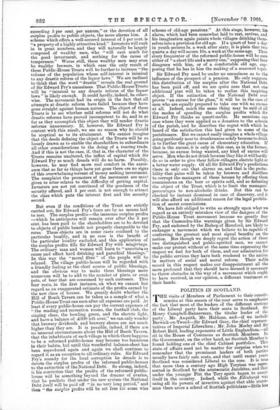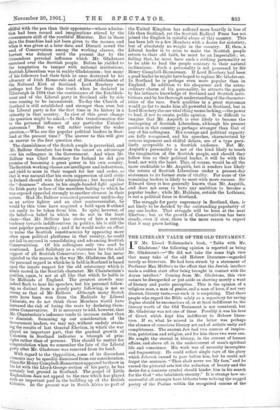POLITICS IN SCOTLAND.
THE visits of Members of Parliament to their constit- uencies at this season of the-year serve to emphasise the fact that most of the leaders of the different sections of the Liberal party have their seats in Scotland. Sir Henry Campbell-Bannerman, the titular leader of the party ; Mr. Asquith, Mr. Haldane, and—if we include Berwick-on-Tweed—Sir Edward Grey, the chief represen- tatives of Imperial Liberalism ; Mr. John Morley and' Sir Robert Reid, leading exponents of Little Englandism,—all sit in the House of Commons as Scottish Members. In the Government, on the other hand, no Scottish Member is found holding one of the chief Cabinet portfolios. This state of affairs need not be matter for Surprise when we remember that the prominent leaders of both parties usually have fairly safe seats, and that until recent years Scotland was considered Liberal to the core. It is true that more than a century ago High Toryism was repre- sented in Scotland by the aristocratic Jacobites, and that under the younger Pitt the Tory spirit began to assert itself in the country. Indeed, while the Edinburgh was using all its powers of invective against that able states- man there arose a school of Scottish politicians—little less efilful With the pen than their opponents—whose admire,- doh. had been roused and imaginations stirred by the consummate skill of the youthful Minister. But in those days the franchise had not been given to the masses, and when it was given at a later date, and Disraeli sowed the seed of Conservatism among the working classes, the hartest was delayed until the present day by the tremendous personal influence which Mr. Gladstone exercised over the Scottish people. Before he yielded to the temptation to tamper with national institutions, Scottish Liberalism was in reality Gladstonism ; but many of his followers had their faith at once destroyed by his advocacy of Irish Home-rule and of Disestablishment of the National Kirk of Scotland. Lord Rosebery was perhaps not far from the truth when he declared in Edinburgh in 1894 that the continuance of the Establish- ment and of the Liberal party in Scotland side by side were coining to be inconsistent. To-day the Church of Scotland is still established and stronger than ever, but the Liberal party is for the first time in its history in a minority in that country. In view of this great change the question might be asked,—Is this transformation due to the personal influence of any particular Unionist statesman ? But we will rather consider the wider question,—Who are'the popular political leaders in Scot- land at the present time ? The answer to this will give an answer to the first question also.
The clannishness of the Scotch people is proverbial, and Mr. Balfour therefore has from the outset an advantage over his colleagues in the Government. And when Mr. Balfour was Chief Secretary for Ireland he did give promise of becoming a great power in his own country. The Scottish working classes are intelligent and industrious, and yield to none in their respect for law and order, so that it was natural that his stern suppression of civil strife in Ireland should win their admiration ; but beyond this the "-dourness " shown in his single-handed fight against the Irish party in face of the merciless baiting to which he was exposed appealed strongly to another element in their nature. Had Mr. Balfour remained prominent until to-day as an active fighter and an alert controversialist, he would by this time have acquired a hold upon Scotland not easily to be taken from him. In spite, however, of the belief—a belief in which we do not in the least share—that Mr. Balfour has shown of late a certain tendency towards indifferentism in politics, his is still the most popular personality ; and if he would make an effort to nurse the Scottish constituencies by appearing more often upon political platforms in that country, he could not fail to succeed in consolidating and advancing Scottish Conservativism. Of his colleagues only two need. be mentioned. Lord Salisbury as a statesman has the solid support of all Scottish Conservatives ; but he has never appealed the masses in the way Mr:Gladstone did, and the personal regard in which he is held in Scotland is based upon the innate respect for the old aristocracy which is firmly rooted in the Scottish character. Mr. Chamberlain's position, again, is not at all like that which he holds in the Midlands of England. The greatest crowds' may indeed flock to hear his speeches, but his personal follow- ing, as distinct from a purely party following, is not so strong as that of Mr. Balfour. Although many Scotch seats have been won from the Radicals by Liberal Unionists, we do not think those Members would have increased the risk of losing the seats by declaring them- selves Conservatives. It is necessary to add, however, that Mr. Chamberlain's influence tends to increase rather than to diminish. Summing up our consideration of the Government leaders, we may say, without unduly strain- ing the results of last General Election, in which the war Played an important part, that the gradual growth of Unionism in Scotland indicates a triumph of prin- ciples rather than of, persons. This should be matter for congratulation when we remember the fate of the Liberal Party after Mr. Gladstone was removed from its head.
With regard to the Opposition, some of its discordant ments may be speedily dismissed from our consideration. Since Sir Henry Cauipbell-Bannerman appeared to throw in his lot with the Lloyd-George section of his party, he has certainly lost ground in 'Scotland.* The' ospel of Little Englanaism does not appeal to the race Which has played such an important imppoortant. part in the building up of the British Cob:mica, the present war in South Africa no part-of the United Kingdom has suffered more heavily in loss of life than Scotland, yet the Scottish Radical Press has not joined the English in spiteful abuse of this country. This has been left to a few Members with a desire for notoriety, but of absolutely no weight in the country. If, then, a Liberal leader is to arise to make the Scottish people return to their old faith, he must be an Imperialist ; or, failing that, he must have such a striking personality as to be able to lead the people contrary to their natural inclinations. Such a personality is not possessed by. Sir. Henry Campbell-Bannerman. If Lord Rosebery had been a good leader he might have hoped to replace Mr. Gladstone. In Scotland he is perhaps even more popular than in England. In addition to his eloquence and the extra, ordinary charm of his personality, he attracts the people by his intimate knowledge of Scotland. and Scottish insti- tutions, and by his thorough understanding of the character- istics of the race. Such qualities in a great statesman would go far to make him all-powerful in Scotland, but in Lord Rosebery the one vital thing seems lacking,—the power to lead, if not to create, public opinion. It is difficult to imagine that Mr. Asquith is ever likely to become the mainspring of Scottish Liberalism, although his present position in that country is perhaps stronger than that of any of his colleagues. His courage and political capacity are fully recognised, and his speeches, characterised by serious argument and slilful debate, are of a type pecu- liarly acceptable to a Scottish audience. But Mr. Asquith's personality is not of the kind likely to touch the imagination of the Scottish people, and should they follow him as their political leader, it will be with the head, not with the heart. This, of course, would be all the more creditable to Mr. Asquith, but it renders less likely the return of Scottish Liberalism under a present-day statesman to its former state of vitality. For none of the remaining leaders is likely to meet with more success. Sir Edward Grey is less generally blown than Mr. Asquith, and does not seem to have any ambition to become a popular leader ; while Mr. Haldane, outside the Lothians; is not a political force in Scotland: The struggle for party supremacy in Scotland, then, is not likely to be decided by the outstanding popularity of any one 'leader. That struggle will be keen at the next Election ; but as the growth of Conservativism has been steady, even if slow, there is the more reason to expect that it may prove lasting.















































 Previous page
Previous page